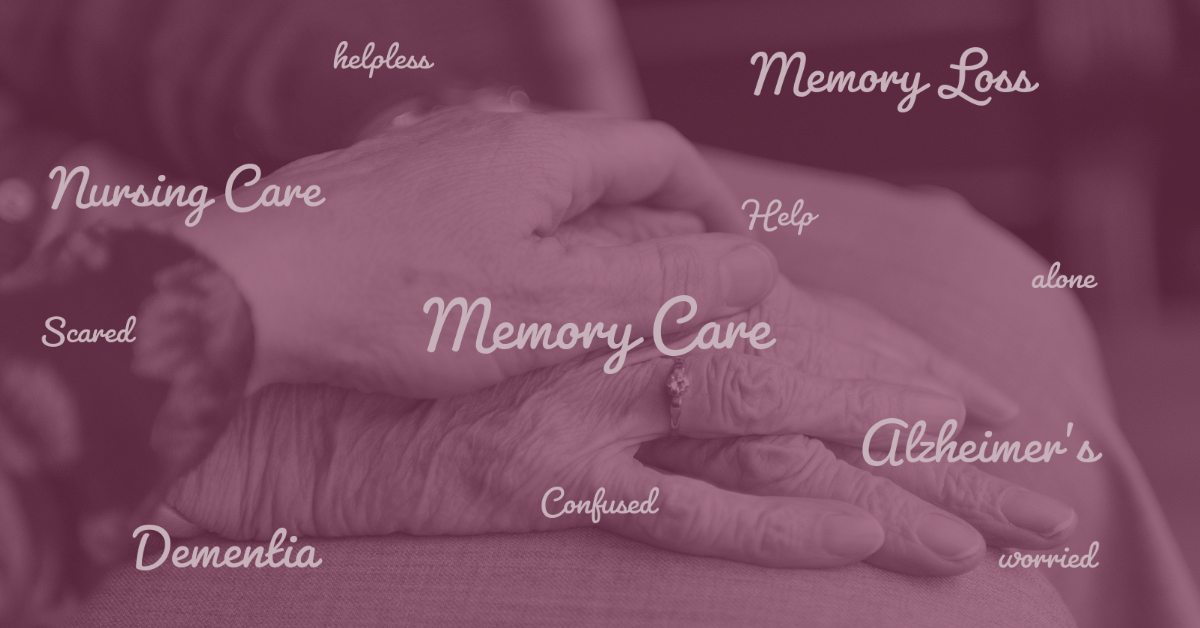If you have a loved one that has been diagnosed with any form of dementia, you have probably heard of the term “memory care”. Memory care is a senior living facility designed to care for people who have memory impairment/dementia. The idea is to provide structure and routine in a secure setting.
Memory Care provides seniors who are living with dementia a safe and secure living environment. As we age, we slowly lose our independence in many ways. For those with memory issues, the loss of independence declines rapidly. It’s important to find ways to maintain as much independence as possible. Memory care can be an option that helps.
What To Expect in a Memory Care Facility
Memory Care facilities are technically Assisted Living Communities that have dementia-trained staff and a locked unit. As an assisted living facility, their capabilities can be limited. They may not be able to provide total care as people decline from their memory loss. Many facilities offer basic care with additional care options for more money. The basic cost often includes room and board, and medication management. If someone needs additional assistance with dressing, bathing or toileting it can be an extra cost. Most memory care facilities provide either private or semi-private rooms for their residents. Those who share a room, will likely have a roommate that the facility should assess and determine compatibility.
Staffing
Most Memory Care facilities have a Nurse available 5 days a week from 9-5pm. In addition they have certified nurses assistants (CNA) or nursing techs that provide the hands-on care for the residents. Many facilities ensure there is care from a nursing tech or CNA 24/7. These nurses’ assistants and techs should have quality dementia-care training on top of their current certifications of nursing care. I recommend asking the facility’s admissions coordinator or executive director for this information.
Facilities have dietary staff that include cooks and dieticians. Some will have separate staff for the serving of the meals. On the other hand, they may use the CNAs and techs to be servers as well. The registered dietician will work with the Resident’s primary care physician and director of nursing to meet their dietary needs.
Housekeeping is also essential to any care facility. Memory care facilities will either hire outside housekeepers or have their own. Some facilities utilize the nursing techs and CNA’s as the housekeeping staff as well.
Many memory care facilities have a “Wellness Coordinator” who oversees activities and the resident’s overall behavioral care for the facility. Some carry-out other duties as well.
There is currently no requirement to have a “Social Worker” in memory care facilities. I always tell my patients or families to take a look at the activities calendar at the facility. Having several options for activities throughout the day can provide both mental stimulation and promote physical health.
Physician Care
Although a memory care facility is mainly run by a Registered nurse, she is under the supervision of a Physician. Federal regulations require facilities to have a medical director who is a physician for each entity. The medical director is responsible for assessing and carrying-out each resident’s plan of care. They also ensure medical policies both federal and state are being maintained. It is their medical license on the line. You can review more of this federal regulation at CMS.gov.
In addition to medical oversight from a physician, the medical director may also be assigned to memory care residents as their primary care physician. Sometimes it’s just more convenient. Having the primary care physician on-site weekly or more makes it easier to make changes. They can add new medications or treatments as needed.
It’s usually not required for a resident to use the medical director as their primary care doctor. Residents have the right to maintain their current primary care provider if they choose to do so. However, they might not have a contract with the memory care facility for them to be able to visit the resident on-site. So continued appointments and transportation to those appointments will be required.
If you choose to keep the current primary care provider, any new orders for medications or treatments will be sent to the memory care facility. From that point the medical director will transcribe those orders and enforce them at the facility.
Emergency Situations
Memory Care facilities still function like an assisted living. Both have different regulations than a nursing home. When it comes to emergency situations, expect staff to take action. They will always call EMT and request a resident be taken to the hospital. If it’s a situation they are not equipped to handle, they will automatically send them to the hospital. Even if a resident has a CPR directive or other life sustaining treatment directive. Memory care facilities are required to treat someone as if they are a Full code (meaning they do everything possible to keep someone alive).
If a resident has several medical issues on top of their memory impairment, hospital admissions can cause more issues. Increased confusion and sometimes aggressive behaviors can arise. If this is the case, talk to the medical director and nurse at the memory care unit to come up with a plan to avoid hospitalizations if possible.
How Much Can You Expect to Pay For Memory Care?
This is kind of another one of those “ugh, it depends” questions. But I’m going to do my best to answer it directly and clearly. First thing is first, location, location, location. Where you live is definitely going to be a factor on the cost! Second is how much care someone needs. Lastly, what amenities and staffing are offered at the memory care.
So in my personal experience, I have seen memory care facilities start around $4000 a month and can go all the way up to $8000 + a month. Most of the time the reason it increases so much from the base price is because they may have private rooms or a whole entire apartment. The amenities they offer and the location plays a part. Ultimately though, it comes down to how much care someone needs. If someone is pretty independent but is unsafe to be alone and just needs help managing medications, the cost is going to be more towards the base price. For each additional service there is a cost. A great resource to finding out the general cost of different memory care facilities is the Senior Blue Book. I give this to my patients and families almost every day!
Maybe it’s just me but $4000 a month as a STARTING point seems pretty hefty! How are people paying for it? Well, people having savings accounts that they have been waiting to use for retirement. They also may get a little help from a Long Term Care insurance plan. As of right now, long term care insurance is the only type of insurance that will pay for memory care. Although it offers plans that can help pay for memory care or other facility care, it typically only pays for PARTIAL care. It all depends on what they offer and what kind of plan you get.
Medicare and Medicaid do not pay for memory care. Medicaid will pay for nursing home placement and SOME assisted living facilities, depending on what State you live in. Those facilities also must be Medicaid certified.
I wish there were more options for seniors to be able to pay for this kind of care, but there just aren’t. However, I don’t know EVERYTHING, so if you are aware of any other options that pays for memory care, please send me an email or comment below to share! In my experience I have not found any other options at this time.


No responses yet